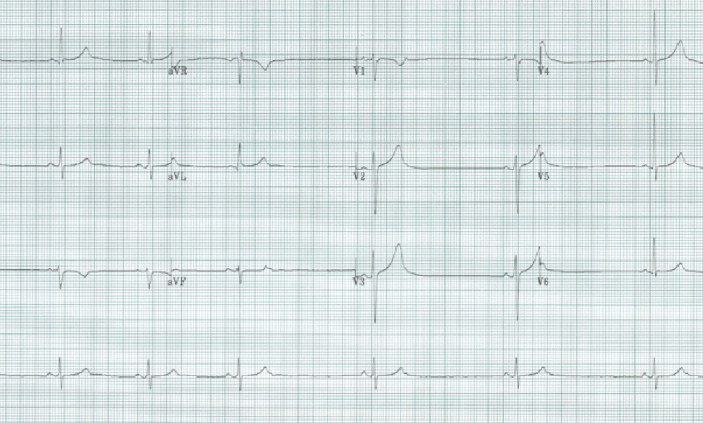Don’t just assume it’s a sinus node dysfunction.
A 60-year-old woman presents with episodes of lightheadedness. She has no significant PMH and is on no medications. She denies syncope, vertigo, chest pain, or shortness of breath. Vital signs on arrival are BP 110/70, HR 55, R 22, O2sat 98%. Brief physical exam is unremarkable. An EKG (Fig. 1, above)is obtained and shows sinus at varying rates but with normal axis and intervals, no LVH, and no acute ischemia or infarct patterns. When her heart rate is 30 beats/minute for any length of time, she becomes symptomatic and experiences lightheadedness.

Fig. 2 (above): Rhythm strip – first three beats are sinus at 50/minute, then an abrupt
change to a rate of 33/minute. The T-waves within the longer R-R intervals are slightly different in appearance; this change in T wave is caused by the influence of a PAC with the ectopic P occurring so early that it does not conduct. The subsequent pause is a non-compensatory pause caused by retrograde conduction of the very early P wave – thus a blocked PAC. Blocked PACs are a common cause of pauses during sinus rhythm. Their presence may cause erroneous diagnosis of sinus arrest, bradycardia, or 2:1 AV block.
OTHER EXAMPLES:
Fig 3. A long pause caused by a blocked PAC with obvious deformity of the
involved T-wave.

Fig 4. A pause during sinus rhythm. Note subtlety deformed T wave due to early
P wave.

Fig 5. A pause during sinus rhythm. Note inverted, ectopic, and premature P wave that is blocked.

Fig 6. Blocked PACs sometimes occur in a pattern of bigeminy. The rhythm will
then appear as sinus bradycardia or 2:1 AV block. Here, note that the P-P intervals
are not the same. The shorter P-P interval contains the QRS and is ended
by a PAC.

When confronted with pause during sinus rhythm, don’t assume sinus node dysfunction. A more benign explanation for this common occurrence is a blocked PAC. Look for a T wave deformed by an ectopic P or for unequal P-P intervals in what might appear as 2:1 AV block.
Just remember: The most common cause of a pause in sinus rhythm is a blocked PAC!




3 Comments
Thank you
Very useful information; I will look for a blocked PAC before I diagnose a patient with sinus arrest or sinus pause. Thank you
Thank you , is there is types of pause